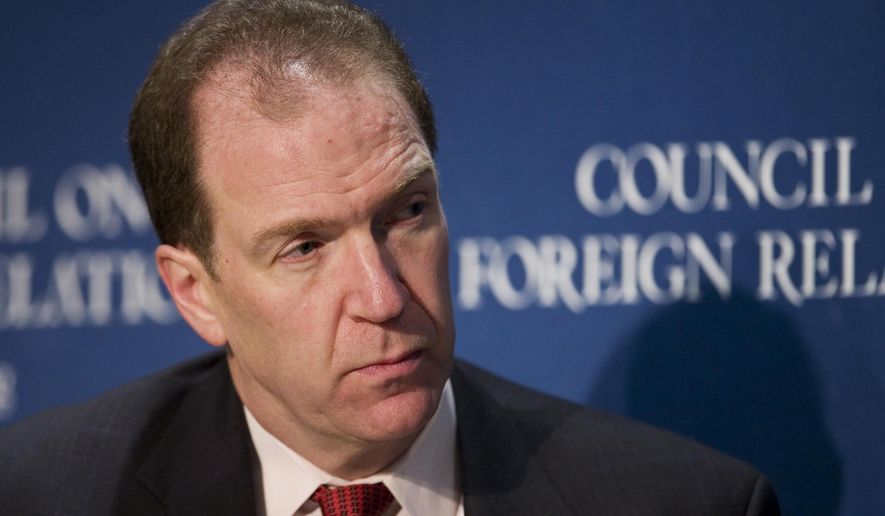President Trump looks to have a fight on his hands if, as expected, he taps Treasury Department official David Malpass to be the next president of the World Bank.
By longstanding custom since the end of World War II, an American heads the global development finance body while a European runs the International Monetary Fund. But that chummy tradition is being challenged this time by China and other emerging economic powers and by critics who say Mr. Trump’s choice has long been a skeptic of the institution he will run.
Mr. Malpass, 62, an economist and veteran of the Reagan and George H.W. Bush administrations who now serves as Treasury undersecretary of international affairs, has a number of strikes against him, as far as the global development community is concerned: He’s seen as a Trump loyalist who has pushed for lending reforms, including scaling back loans to wealthier countries, starting with China.
Another objection: He’s an American at a time when “the right of the U.S. to appoint the World Bank head has been increasingly questioned,” said Martin S. Edwards, associate professor and director of graduate studies at Seton Hall University’s School of Diplomacy and International Relations.
“Malpass fits the pattern of Bush appointees in having a mix of private sector and government experience, but not having development experience,” said Mr. Edwards. “His appointment fits the Trump pattern of prizing ideological loyalty above all else, and that’s the concern.”
In a 2018 speech, Mr. Malpass characterized the World Bank as one of “a host of organizations [that] are creating mountains of debt without solving problems.”
“Huge organizations like the World Bank and the many multilateral development banks have created an environment where their own growth ends up being as important as their clients’ growth,” he added.
As a result, speculation is swirling that the nomination, which is expected to be announced later this week, could spur a revolt if European nations on the World Bank board withhold their support and prevent the former Bear Stearns chief economist from gaining a simple majority.
Leading European powers have clearly chafed at Mr. Trump’s “America first” foreign policy and his willingness to use tariffs and sanctions to punish friend and foe alike. Whether they will use the World Bank pick as a way to retaliate is an open question.
“This sets up a potential contest with European countries,” Mr. Edwards said. “Will they want to see the bank increasingly politicized? Do France, Germany, and the U.K. have the energy to fight the U.S. on this? Can they agree on a candidate?”
While 189 countries belong to the World Bank, the United States is the largest shareholder with 17.25 percent of the institution’s capital shares, according to a 2017 investor brief.
Mr. Malpass would succeed Jim Yong Kim, a South Korean-born, U.S. physician first nominated by President Barack Obama, who announced last month he would step down three years before the expiration of his second five-year term as World Bank president.
Rumblings against the traditional selection process emerged on the left shortly after multiple news outlets reported Monday that Mr. Malpass was the president’s choice.
Critics cited his August 2007 op-ed, “Don’t Panic About the Credit Market,” written during his tenure at Bear Stearns, which collapsed less than a year later in the 2008 financial crisis. Mr. Malpass is also viewed as an ally in the Trump administration’s push to challenge multinational institutions.
“His disdain for the World Bank’s mission of fighting global poverty rivals John Bolton’s respect for the United Nations,” said Justin Sandefur, senior fellow at the Center for Global Development, in a statement.
Mr. Malpass has been critical of the World Bank and IMF, testifying in 2017 that they were “often corrupt in their lending practices, and they don’t get the benefit to the actual people in the countries” but to those “who fly in on a first-class airplane ticket to give advice to the government officials,” according to AFP.
At the same time, he led negotiations last year to increase the World Bank’s capital by $13 billion tied to reforms such as focusing on lending to poorer nations and internal cost-cutting that included reductions in staff salary growth.
“David has been covering the World Bank and inserting himself in World Bank matters for decades,” a senior administration official told CNBC. “… He shares the president’s views. Malpass knows the World Bank senior staff and a lot of the senior staff support him.”
• Valerie Richardson can be reached at vrichardson@washingtontimes.com.




Please read our comment policy before commenting.